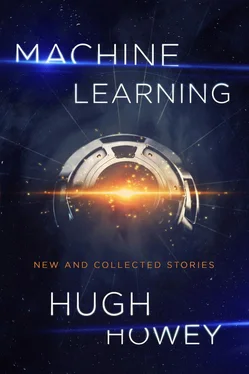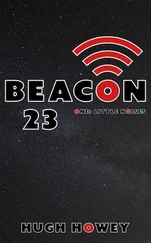“I don’t know.” Dmitry shook his head. He started to say something, then turned quietly back to his work.
“What?” Tracy asked. “Is there something you aren’t telling me?”
“It’s… nothing.” He set the tubing aside and crossed his arms. Then he turned to her. “Why do you think nobody is fighting for their place in there?” He nodded to the machine.
Tracy hadn’t considered that. “Because I asked first?” she guessed.
“Because that thing is a coffin. People have been putting their loved ones in there for years. Nobody wakes up.”
“So this is a bad idea?”
Dmitry shrugged. “I think maybe the people who do this, it isn’t for the ones inside the box.”
Tracy lay back in that steel cylinder and considered this, the selfishness of it all. Giving life without asking. Taking life to save some other. “For the last two days,” she said, “all I’ve thought about is what a mistake all this was.” She closed her eyes. “Completely pointless. All for nothing.”
“That is life,” Dmitry said. Tracy opened her eyes to see him waving a tool in the air and staring up at the ceiling. “We do not go out in glory. We leave no mark. What you did was right. What they did was wrong. They’re the reason we’re in this mess, not you.”
Tracy didn’t feel like arguing. What was the point? It didn’t matter. Nothing mattered. And maybe that’s what Dmitry was trying to tell her.
She crawled out of that coffin-within-a-crypt to check the supplies one last time, to make sure the vacuum was holding a seal. Inside the large storage trunk were her handwritten instructions, a set of maps, two handguns, clothing, all of Remy and April’s camping gear, and what extra rations would fit.
Five hundred years was a long time to plan for, almost an impossible time to consider. And then it occurred to her that she was wrong about something: She was wrong about the great doors that led into that mountain. This was not a crypt. The dead were on the outside. Here was but a bubble of life, trapped in the deep rock. A bubble only big enough now for fifteen people. Fifteen plus two.
Before waking her sister, Tracy stole into her father’s room and kissed him quietly on the forehead. She brushed his thinning hair back and kissed him once more. One last time. Wiping tears away, she moved to the neighboring room. Igor and Anatoly were waiting outside the door. They had agreed to help her, had been unhappy with her decision, but she had traded her one precious spot for two questionable others.
They stole inside quietly. The Russians had syringes ready. They hovered over Remy first. It went fast, not enough kicking to stir her sister. April was next. Tracy thought of all she was burdening them with, her sister and Remy. An accountant and a schoolteacher. They would sleep tonight, and when they woke, what would they find? Five hundred years, gone in an instant. A key around their necks. A note from her. An apology.
Igor lifted April, and Tracy helped Anatoly with Remy. They shuffled through dark corridors with their burdens. “Carry on,” Tracy whispered, that mantra of theirs, the awful dismissal of all they’d done. But this time, it was with promise. With hope. “Carry on,” she whispered to her sister. “Carry on for all of us.”
Asliver of light appeared in the pitch-black—a horizontal crack that ran from one end of April’s awareness to the other. There was a deep chill in her bones. Her teeth chattered; her limbs trembled. April woke up cold with metal walls pressed in all around her. A mechanical hum emanated from somewhere behind her head. Another body was wedged in beside her.
She tried to move and felt the tug of a cord on her arm. Fumbling with her free hand, April found an IV. She could feel the rigid lump of a needle deep in her vein. There was another hose along her thigh that ran up to her groin. She patted the cold walls around herself, searching for a way out. She tried to speak, to clear her throat, but like in her nightmares, she made no sound.
The last thing April remembered was going to sleep in an unfamiliar bunk deep inside a mountain. She remembered feeling trapped, being told the world had ended, that she would have to stay there for years, that everyone she knew was gone. She remembered being told that the world had been poisoned.
April had argued with her husband about what to do, whether to flee, whether to even believe what they’d been told. Her sister had said it was the air, that it couldn’t be stopped, so a group had planned on riding it out here. They’d brought them in buses to an abandoned government facility in the mountains of Colorado. They said it might be a while before any of them could leave.
The body in the dark by April’s feet stirred. There was a foot by her armpit. They were tangled, she and this form. April tried to pull away, to tuck her knees against her chest, but her muscles were slow to respond, her joints stiff. She could feel the chill draining from her, and a dull heat sliding in to take its place—like the tubes were emptying her of death and substituting that frigid void with the warmth of life.
The other person coughed, a deep voice ringing metallic in the small space, hurting her ears. April tried to brace herself with the low ceiling to scoot away from the coughing form, when the crack of light widened. She pushed up more, grunting with the strain, and even more light came in. The ceiling hinged back. The flood of harsh light nearly blinded her. Blinking, eyes watering, ears thrumming from the sound of that noisy pump running somewhere nearby, April woke with all the violence and newness of birth. Shielding her eyes—squinting out against the assault of light—she saw in her blurry vision a man lying still by her feet. It was her husband, Remy.
April wept in relief and confusion. The hoses made it hard to move, but she worked her way closer to him, hands on his shins, thighs, clambering up his body until her head was against Remy’s chest. His arms feebly encircled her. Husband and wife trembled from the cold, teeth clattering. April had no idea where in the world they were or how they got there; she just knew they were together.
“Hey,” Remy whispered. His lips were blue. He mouthed her name, eyes closed, holding her.
“I’m here,” she said. “I’m here.”
The warmth continued to seep in. Some came from their naked bodies pressed together; some came directly through her veins. April felt the urge to pee, and her body—almost of its own volition, of some long-learned habit—simply relieved itself. Fluid snaked away from her through one of the tubes. If it weren’t for the too-real press of Remy’s flesh against her own, she would think this was all a dream.
“What’s happening?” Remy asked. He rubbed his eyes with one hand.
“I don’t know.” April’s voice was hoarse. A whisper. “Someone did this to us.” Even as she said this, she realized it was obvious, that it didn’t need saying. Because she had no memory of being put in that metal canister.
“My eyes are adjusting,” she told Remy. “I’m going to open this up some more.”
Remy nodded slowly.
Peering up, April saw a curved half-cylinder of gleaming steel hanging over them, a third of the way open. She lifted a quivering leg, got a foot against the hinged lid, and shoved. Their small confines flew open the rest of the way, letting in more light. Flickering bulbs shone down from overhead. The lamps dangled amid a tangle of industrial pipes, traces of wire, air ducts, and one object so out of place that it took a moment to piece together what she was seeing. Suspended from the ceiling, hanging down over their heads, was a large yellow bin: a heavy-duty storage trunk.
Читать дальше












